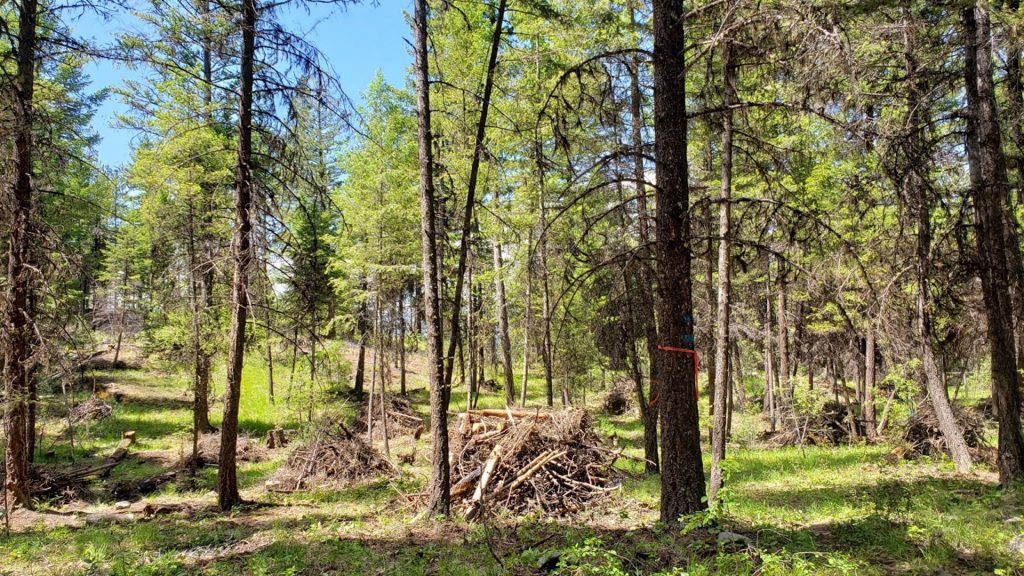
Debris is cleaned up in the forest near the Penticton Indian Band in southern B.C. Photo: APTN file
The Penticton Indian Band (PIB) is working with BC Wildfire Service on a new wildfire risk reduction project using traditional syilx methods.
“All of the PIB [wildfire risk reduction] projects are informed by Elders and knowledge keepers,” says James Pepper, director of PIB’s natural resource department. “They write the prescriptions, then we implement them.”
Pepper says PIB has done several wildfire risk reduction projects throughout the Southern Okanagan over the last few years.
The latest project, which started on Nov. 9, involves burning around 1,300 piles of wood debris in syilx territory around the city of Penticton — in the Penticton Creek watershed, around White Lake Basin, along the Naramata Bench and in the urban Carmi area.
“Smoke and/or flames may be visible from Kelowna, Peachland, Summerland, Penticton, Okanagan Falls and HWY 97,” according to PIB’s media release.
“We remove residual timber, we prune the base of larger trees, and we clean up fuel debris on the ground,” says Pepper, who worked in PIB’s natural resources department since 2015.
“Sometimes, depending on the amount of fuel on the ground, we pile it and burn it. And sometimes if it’s less fuel or an appropriate amount of fuel, we spread it out and do a prescribed burn.”
Pepper says the project will be carried out between now and February, and the main goal is to prevent catastrophic wildfires in the upcoming fire season.
“Traditional prescribed burning has been suppressed for many decades. And as a result, fuel has built [on the] forest floor,” he says.
“If there’s a wildfire now, it’s kind of catastrophic. It burns very, very hot and it can move very quickly and burn a lot of ground. Whereas previously, when it was managed by the syilx people, these fires were way less intense and didn’t spread so quickly or burn so hot.
“In the Okanagan, the forests are actually fire dependent. A lot of the seeds won’t open up unless heat and fire is introduced, so fire is a natural part of the life cycle.”
Pepper says PIB is working closely with syilx elders and traditional fire knowledge keepers from multiple communities throughout the syilx Okanagan Nation to ensure this collaborative project follows syilx protocols.
“We’re restoring the landscape back to a managed landscape in the syilx traditional way in collaboration with the province via BC Wildfire.
After “years and years of lobbying by Indigenous Peoples,” Pepper says the province is providing more resources to implement traditional practices.
“We have a really strong and wonderful partnership with the BC Wildfire Service,” he adds. “We keep [them] informed with the traditional firekeepers’ knowledge and then they incorporate Western scientific knowledge as well.
“The traditional approach doesn’t necessarily measure kilojoules of energy on the ground, but that information is important and that’s what the scientific part does … it just makes the process more robust and even better”.
He says they decide which areas to burn based on available funding (which tends to be targeted toward “urban forest interface”), as well as “cultural significance and needs.”
“We really do want to reach out to other Indigenous communities, syilx communities to show them how we got to where we are. We have a very large, well-trained crew now.”
He says this year’s crew includes 19 people from PIB and five from BC Wildfire.
“We’re hopeful that the province will continue to recognize this as being a very important proactive measure, as well as the Indigenous leadership … given the thousands of years of knowledge and experience in this regard, and that all communities will be able to develop programs for the good of all.”
To report a wildfire, unattended campfire, or open burning violation in B.C., call 1-800-663-5555 toll-free or *5555 on a cell phone.










